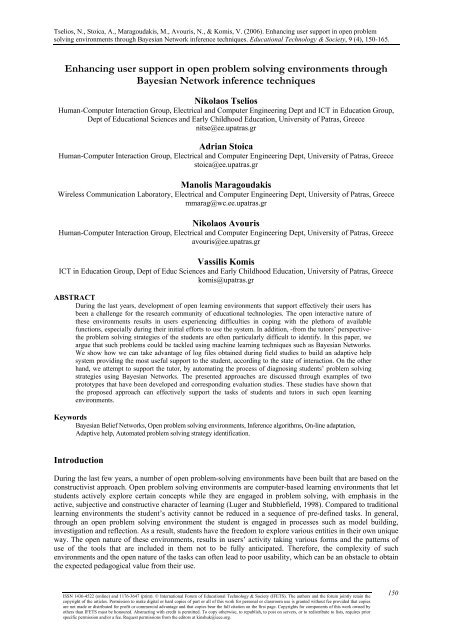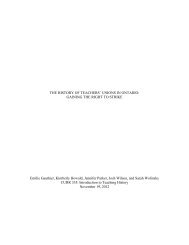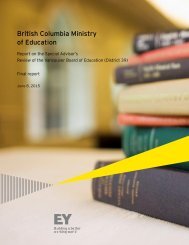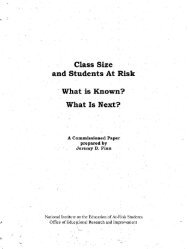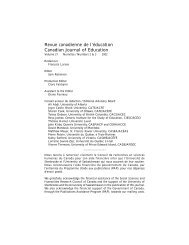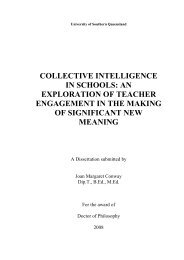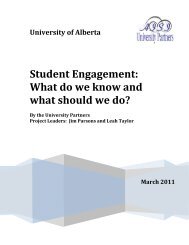October 2006 Volume 9 Number 4
October 2006 Volume 9 Number 4
October 2006 Volume 9 Number 4
Create successful ePaper yourself
Turn your PDF publications into a flip-book with our unique Google optimized e-Paper software.
Tselios, N., Stoica, A., Maragoudakis, M., Avouris, N., & Komis, V. (<strong>2006</strong>). Enhancing user support in open problem<br />
solving environments through Bayesian Network inference techniques. Educational Technology & Society, 9 (4), 150-165.<br />
Enhancing user support in open problem solving environments through<br />
Bayesian Network inference techniques<br />
Nikolaos Tselios<br />
Human-Computer Interaction Group, Electrical and Computer Engineering Dept and ICT in Education Group,<br />
Dept of Educational Sciences and Early Childhood Education, University of Patras, Greece<br />
nitse@ee.upatras.gr<br />
Adrian Stoica<br />
Human-Computer Interaction Group, Electrical and Computer Engineering Dept, University of Patras, Greece<br />
stoica@ee.upatras.gr<br />
Manolis Maragoudakis<br />
Wireless Communication Laboratory, Electrical and Computer Engineering Dept, University of Patras, Greece<br />
mmarag@wc.ee.upatras.gr<br />
Nikolaos Avouris<br />
Human-Computer Interaction Group, Electrical and Computer Engineering Dept, University of Patras, Greece<br />
avouris@ee.upatras.gr<br />
Vassilis Komis<br />
ICT in Education Group, Dept of Educ Sciences and Early Childhood Education, University of Patras, Greece<br />
komis@upatras.gr<br />
ABSTRACT<br />
During the last years, development of open learning environments that support effectively their users has<br />
been a challenge for the research community of educational technologies. The open interactive nature of<br />
these environments results in users experiencing difficulties in coping with the plethora of available<br />
functions, especially during their initial efforts to use the system. In addition, -from the tutors’ perspective-<br />
the problem solving strategies of the students are often particularly difficult to identify. In this paper, we<br />
argue that such problems could be tackled using machine learning techniques such as Bayesian Networks.<br />
We show how we can take advantage of log files obtained during field studies to build an adaptive help<br />
system providing the most useful support to the student, according to the state of interaction. On the other<br />
hand, we attempt to support the tutor, by automating the process of diagnosing students’ problem solving<br />
strategies using Bayesian Networks. The presented approaches are discussed through examples of two<br />
prototypes that have been developed and corresponding evaluation studies. These studies have shown that<br />
the proposed approach can effectively support the tasks of students and tutors in such open learning<br />
environments.<br />
Keywords<br />
Bayesian Belief Networks, Open problem solving environments, Inference algorithms, On-line adaptation,<br />
Adaptive help, Automated problem solving strategy identification.<br />
Introduction<br />
During the last few years, a number of open problem-solving environments have been built that are based on the<br />
constructivist approach. Open problem solving environments are computer-based learning environments that let<br />
students actively explore certain concepts while they are engaged in problem solving, with emphasis in the<br />
active, subjective and constructive character of learning (Luger and Stubblefield, 1998). Compared to traditional<br />
learning environments the student’s activity cannot be reduced in a sequence of pre-defined tasks. In general,<br />
through an open problem solving environment the student is engaged in processes such as model building,<br />
investigation and reflection. As a result, students have the freedom to explore various entities in their own unique<br />
way. The open nature of these environments, results in users’ activity taking various forms and the patterns of<br />
use of the tools that are included in them not to be fully anticipated. Therefore, the complexity of such<br />
environments and the open nature of the tasks can often lead to poor usability, which can be an obstacle to obtain<br />
the expected pedagogical value from their use.<br />
ISSN 1436-4522 (online) and 1176-3647 (print). © International Forum of Educational Technology & Society (IFETS). The authors and the forum jointly retain the<br />
copyright of the articles. Permission to make digital or hard copies of part or all of this work for personal or classroom use is granted without fee provided that copies<br />
are not made or distributed for profit or commercial advantage and that copies bear the full citation on the first page. Copyrights for components of this work owned by<br />
others than IFETS must be honoured. Abstracting with credit is permitted. To copy otherwise, to republish, to post on servers, or to redistribute to lists, requires prior<br />
specific permission and/or a fee. Request permissions from the editors at kinshuk@ieee.org.<br />
150


